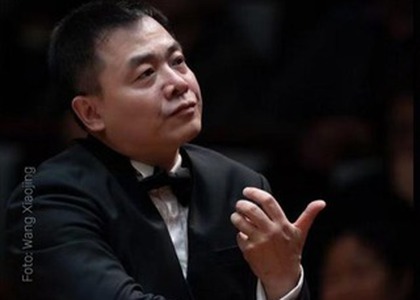> Interviews

Interview with conductor Zhang Yi
For the first time, Zhang Yi - Music Director of the National Ballet of China and Artistic Director of both the Shanghai Philharmonic Orchestra and the Zhejiang Symphony Orchestra - will take the rostrum of the National Radio Orchestra. The concert, scheduled for Friday, November 14th, at Radio Hall, is dedicated entirely to the music of Ludwig van Beethoven. Beginning at 7:00 PM, the orchestra will perform three of his emblematic works: the Coriolan Overture, Op. 62, Piano Concerto No. 3 in C minor, Op. 37, and Symphony No. 7 in A major, Op. 92.
Currently on his first visit to Romania, Zhang Yi is also giving a conducting masterclass this afternoon at the National University of Music Bucharest. Amid rehearsals and preparations, conductor Zhang Yi granted an interview to our colleague Ariadna Ene-Iliescu. The interview was conducted with the assistance of the translations provided by Ionela Staicu from the Chinese Cultural Center in Bucharest.
To begin, I would like to talk about the program you will present on the stage of Radio Hall. You will conduct Beethoven's Symphony No. 7, described by Richard Wagner as "the apotheosis of the dance." You are the conductor of the National Ballet of China and have developed a particular sensitivity to dance. How do you relate to Wagner's statement?
I believe that the Symphony No. 7 is inherently connected to dance and that it represents, at the same time, a triumph of Beethoven's creative power. In my view, it is essentially a radiant work - a pinnacle of artistic achievement.
I am Chinese, I studied music in Germany, and now I am coming to Romania to conduct Beethoven. Therefore, I consider Beethoven to be an artist of the world, not solely of Germany. His music unites us all, no matter which country we come from.
What does Beethoven's music mean to you personally?
I believe that Beethoven remains the greatest musician in the world. If we had to choose a single composer representative of the entire history of music, I think many would choose Beethoven. He is so important because, on one hand, he carried forward the legacy of his predecessors - Bach, Haydn, Mozart. Beethoven represents a crucial link in the history of music. At the same time, he is of immense significance because he composed in nearly all the existing genres of his era and wrote music for most of the instruments of his time.
According to today's standards and criteria, one might think that Beethoven lived an unhappy life - he struggled with health issues, he never married - it doesn't seem a particularly fortunate destiny. But he viewed the circumstances of his life as challenges to be faced, and ultimately, he succeeded in leaving behind immense masterpieces. Through this love and devotion to humanity, he managed to express everything he carried within. In Beethoven's works, one can feel this profound love for the world.
Let us now speak about your connection to Romania. Although this is your first time in our country, I know that you have already come into contact with aspects of Romanian culture and with Romanian musicians, and that you have also promoted Romanian music…
When I was a child, Romanian films were very popular in China. I had already begun studying the violin at a young age. At that time, the film "Ciprian Porumbescu" could be viewed in China. I can say that this film left a very strong impression on those of my generation. Later, when I entered the music school in Beijing, around 1985, a violin competition was held there, and Maestro Ion Voicu was part of the jury. That is how I met him. Even though I had never been to Romania until now, I keep alive the memory of those Romanian musicians who had a significant influence on me since childhood. During that period, before I turned twelve, I also learned several Romanian pieces - Grigoraș Dinicu's "Hora Staccato" and "Ciocârlia".
Thus, these were my first connections with Romania: through films, musicians, and musical scores.
Later, while studying in Saarbrücken, Germany, I was fortunate to have a good Romanian friend and colleague - conductor Liviu Petcu. I have not seen him in over twenty years, but he has remained very dear to me. He was the one who taught me how to greet someone in Romanian.
More recently, my relationship with Romania has become increasingly close. Last year, on the occasion of the 75th anniversary of diplomatic relations between Romania and China, I invited a Romanian conductor to China. Under the baton of Gabriel Bebeșelea, the Shanghai Philharmonic Orchestra presented, for the first time, a program devoted entirely to Romanian music, featuring works by Dan Dediu, Theodor Rogalski, and George Enescu. It was truly a significant moment for cultural exchange between our two countries.
This, in short, is my connection to Romania - from my early impressions in childhood to the present day.
As for repertoire: yes, I have conducted Romanian music in China. Romanian musical creation is not yet sufficiently known in China. Ciprian Porumbescu and George Enescu are the two Romanian composers known there - Enescu in particular, as he is a figure of global influence. Personally, I consider him a "Beethoven of Romania."
I have had the honor of conducting Romanian Rhapsody No. 1, a work known by anyone active in the field of music, including in China. As a child, I also studied Porumbescu's Ballad. Later on, I conducted György Ligeti's Romanian Concerto - a Hungarian composer of Transylvanian origin.
Translated by Miruna-Camelia Baicu,
University of Bucharest, Faculty of Foreign Languages and Literatures, MTTLC, year II
Corrected by Silvia Petrescu














